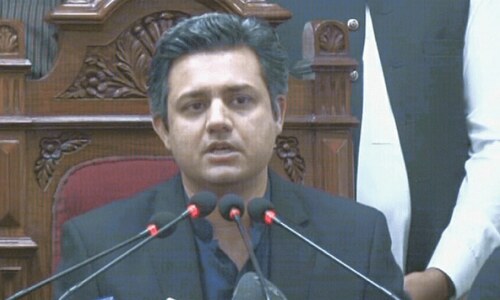ISLAMABAD: Awareness must be spread about the use of vaccines throughout Pakistan as they are one of the best tools that can be used to improve health and well-being of people everywhere, director general of Ministry of National Health Services (NHS) Dr Rana Mohammad Safdar said on Tuesday.
He was speaking to participants of an event jointly organised by the health ministry and Federal Directorate of Immunisation (FDI) to commemorate ‘World Immunisation Week (WIW), 2022’. The theme for the day this year was ‘Long Life for All’.
Every year, WIW is celebrated in the last week of April (24 to 30), aiming to promote the use of vaccines to protect people of all ages, against infectious diseases.
The FDI director general, Dr Akram Shah, said this year’s theme would urge greater engagement around immunisation globally to promote the importance of vaccination and improving the health and well-being of everyone, everywhere.
Health Secretary Aamir Ashraf Khwaja said he would like to take the opportunity to salute immunisation champions.
“Without these champions we would not have been able to conduct the largest ever immunisation campaign for measles and rubella. Through these champions, we were able to reach and vaccinate 93 million children in Pakistan,” he said.
The event also marked dissemination of the National Immunisation Policy 2022. Updated after a period of six years to strategically respond to recent developments, targets and goals, the document is aligned with National Health Vision 2025 and the International Immunisation Agenda 2030 (IA2030).
Dr Safdar urged the FDI, provincial Expanded Programme of Immunisation teams, donors, technical partners and civil society organisations to take the document as a strategic guideline for effective implementation of policy.
Routine immunisation is a set of inoculations, given to children from birth to the age of 15 months. Completing the schedule protects them from 12 diseases that are preventable through vaccines, such as tuberculosis, polio, diphtheria, pertussis (whooping cough), tetanus, haemophilus influenza type B, hepatitis B, diarrhoea, pneumonia, typhoid, measles and the recently added rubella.
The entire course is provided free-of-cost by the government with support from global and technical partners, such as Gavi, the Vaccines Alliance, the World Health Organisation (WHO) and United Nations Children’s Education Fund (Unicef).
WHO Representative in Pakistan Dr Palitha Mahipala said: “It is indeed a time to cherish our success, but it is also a moment of reflection so plans can be made. We have a long way to go in order to reach the unreached by strengthening the routine immunisation coverage, reaching the highly risked pockets to protect people, particularly children, from all diseases.”
WHO works with countries to raise awareness of the value of immunisation and ensures that governments obtain necessary guidance and technical support to achieve the goal of universal immunisation, said Dr Palitha.
Published in Dawn, April 27th, 2022












































Dear visitor, the comments section is undergoing an overhaul and will return soon.